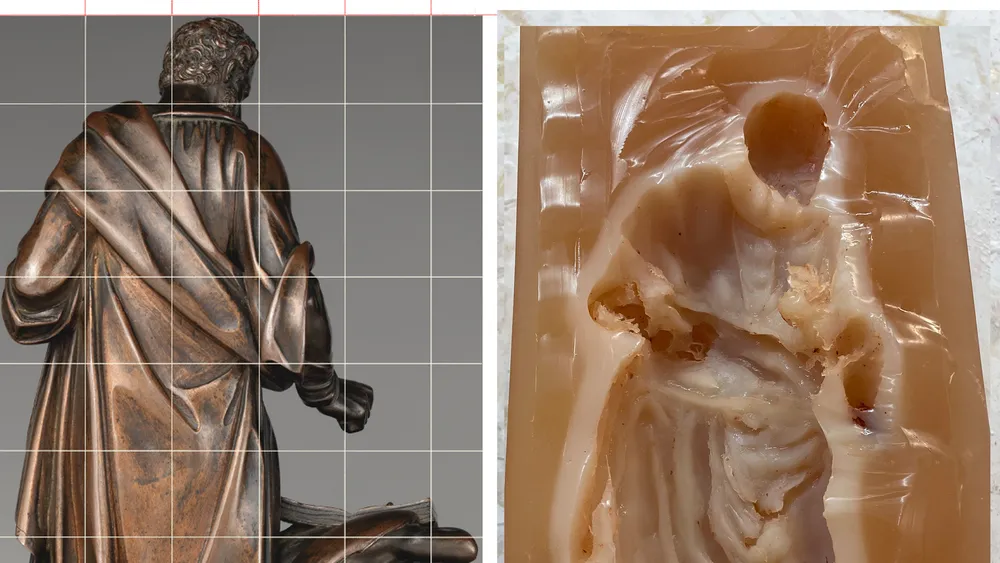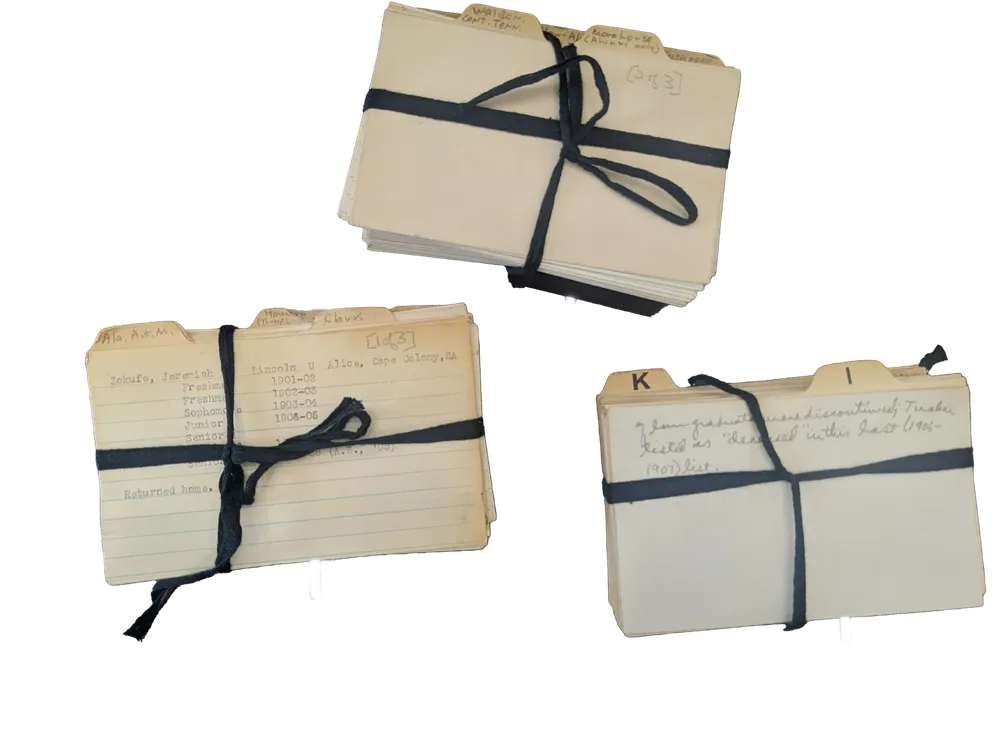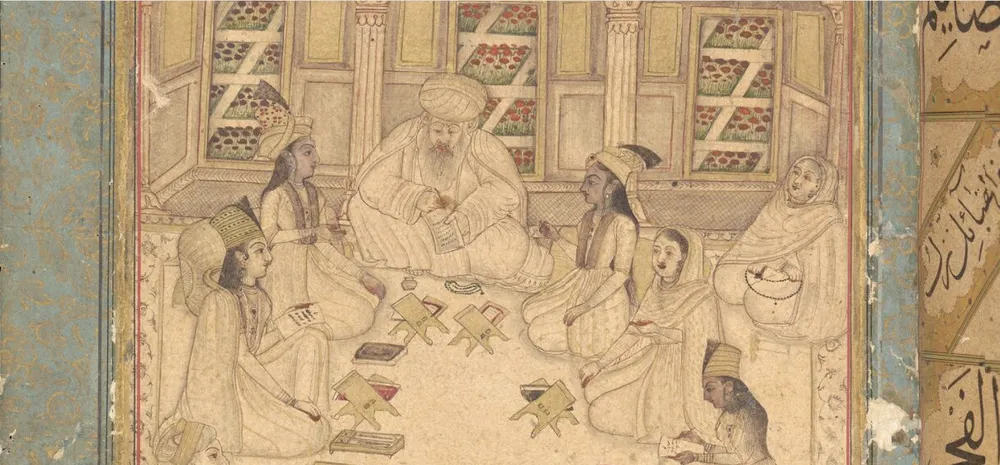Finishing the year with Startwords. Introducing Issue 5: Processes
23 December 2024
Issue 5 features three grad students using data curation and visualization to highlight the importance of everyday, historical people whose lives may otherwise have remained unknown to us.

Met. Museum of Art, New York, Purchase, Joseph Pulitzer Bequest, 1957, 57.136.2.
(L.) Antonio Susini (model and cast, possibly after Giambologna), Saint Matthew, 1596, bronze. (R.) Half of rubber mold to cast in wax. See “Casting in Reverse,” Sharifa Lookman.
Startwords is a journal for experimental humanities research, irregularly published by the CDH since 2020. Reading on its native platform is a unique experience by design. We recommend heading there to read more about this issue!
Introduction from Startwords editor, Grant Wythoff:
This issue of Startwords features the work of three leading graduate students from the Center for Digital Humanities at Princeton. While their work spans disciplines and historical periods, these scholars all use data curation and visualization to highlight the importance of everyday, historical people whose lives may otherwise have remained unknown to us: non-elites in early modern South Asia, nineteenth-century African students attending US universities, and craftspeople who aided the work of sculptors in the Renaissance.

Detroit Institute of Arts, City of Detroit Purchase, 25.20.
Antonio Susini; after Giovanni da Bologna, Lion Attacking Horse, ca. between 1580 and 1590, bronze, red lacquer.
In “Casting in Reverse,” art historian Sharifa Lookman writes of Antonio Susini, studio assistant to famous Renaissance sculptors. For technicians working in bronze, like Susini, “in order to achieve the height of their craft, they must erase all traces of their labor.” In her remarkable work, Lookman reverse engineers these labors through 3D scanning, photogrammetry, and an internship with a local metal foundry “to understand the intricacies of casting, from wax to bronze.” At times, these digital and analog processes inflect one another, as they do when Lookman uses casting wax to secure a sculpture to the base of a 3D scanner. Lookman aims in her dissertation to rewrite the history of art as a history of process. But she herself fully engages with these artistic processes in order to better understand them.

Horace Mann Bond Papers, Robert S. Cox Sp Coll & U Arch Res Ctr, UMass Amherst.
Sample Set of Index Cards. “African Students Survey: Index Cards,” 1961.
Religion scholar Kimberly Akano in “Visualizing African Student Mobility” traces the migrations of late-nineteenth and early-twentieth century students from Africa to historically Black colleges and universities in the United States. Akano draws on Kim Gallon in hoping that her dataset can “be used as a ‘technology of recovery’ to begin unearthing the narratives of African students.” At the center of Akano’s work is an extraordinary collection of index cards maintained by Horace Mann Bond—a midcentury leader at Atlanta and Lincoln Universities—that records the names, origins and destinations, areas of study, and eventual occupation of these students over more than a century. Bond’s goal was “to demonstrate the underappreciated role of HBCUs in educating West African leaders such as Nnamdi Azikiwe (later the first president of Nigeria) and Kwame Nkrumah (the first president of Ghana).” But Akano takes this handmade dataset and uses it to map hundreds of lesser-known students’ journeys.

Collection of the Royal Asiatic Society, RAS Persian 258. Accessed Oct 2, 2024.
An elderly man teaching female students and attendants. The illustration is inserted into a Gulistan manuscript copied at Fatehpur Sikri in 990 HJ / 1582-3 CE.
Finally, in “Mapping Persian Literacy in Early Modern South Asia,” historian Hasan Hameed grapples with archival silences in a region “where two centuries of British colonialism systematically distorted local libraries, archives, and collective memory.” Hameed’s article tracks the spread and influence of the Gulistan (Rose-Garden), a Persian poem composed in the mid-thirteenth century that educators used for centuries to “teach students how to behave and how to appreciate language.” Though a countless number of these manuscripts have been lost over time to “wind, water, and worms,” as Hameed puts it, the hundreds that remain speak to a remarkable spread of Persian literacy in early modern India among everyday people, “beyond courtly elites.” Through his maps, Hameed shows how this Islamic text circulated among Sikh and Hindu communities, traveling thousands of miles from Southern India all the way to present-day Western Afghanistan.
All three contributors here reflect on method in digital humanities, each concluding that these methods are primarily valuable not in their ability to prove something incontrovertibly but rather as tools for thought. For Akano, “the process of creating the digital products was itself a practice of scholarly interpretation.” Hameed writes that in cleaning hundreds of bibliographic records, he realized any one of those records can “reveal an entire world of knowledge production and transmission.” And Lookman curated a dataset that led her to find “unnoticed patterns and trends . . . filling the gaps in what we can know.” Far from automating scholarly labor, these practices, methods, and processes in DH demand additional thought and reflection.
Issue releases
Startwords is a research periodical irregularly published by the Center for Digital Humanities at Princeton. More formal than a blog yet more speculative and iterative than a peer-reviewed journal, Startwords is a forum for experimental humanities scholarship. Embedded code, data physicalizations, design, and emerging forms of process documentation are detailed through writing that is essayistic, creative, and research-driven.
While we are not accepting submissions for future issues, we welcome your thoughts and feedback on any aspect of the project. We would especially love to hear from those of you who have used Startwords in your research or teaching. Please contact us via email at cdh-info@princeton.edu with the subject “Startwords.”



